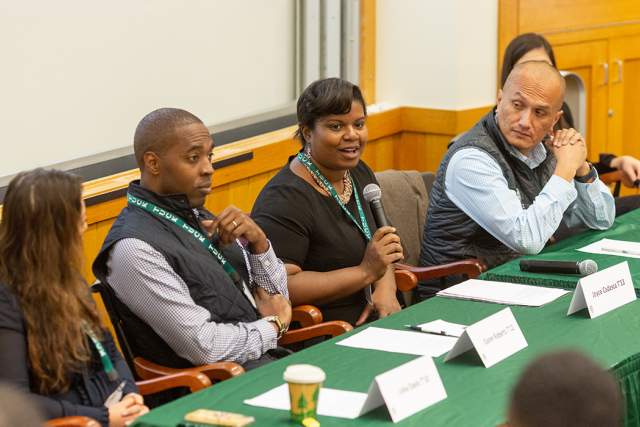Recently, I’ve been reading Michelle Obama’s autobiography to my daughter before bed.
It’s been fascinating reading a book that frequently addresses the struggles that working mothers face to the child of a working mother. At points she has laughed and said, “That sounds JUST like you.” Other times she’s noticed that my eyes are welling up and I’ve had to stop reading for a minute to catch my breath … and she’s just quietly snuggled closer.

Susan Hunt Stevens T’98
One of the stories in the book that has stuck with me most occurred earlier in her working life, when Sasha was a three-month old. She had been considering staying home full-time, but was asked to interview for an executive director position with the new president at the University of Chicago Medical Center. She can’t remember whether her childcare fell through or whether she just didn’t bother arranging it, but she showed up with Sasha for the interview. She and Michael Riordan, the new president, spoke while she bounced Sasha on her lap, hoping her diaper wouldn’t leak. As she says, “I wasn’t going to try to hide the messiness of my existence, from the breast-feeding baby and the three-year-old in preschool to the fact that with my husband’s topsy-turvy political schedule I was in charge of more or less every aspect of life at home.” She got the job.
Had I been in the same situation, I don’t think I would even consider doing a job interview with a newborn on my lap. I never would been brave enough to try. It made me wonder how often we walk away from an opportunity because of a presumption that something about our “whole self” will be unacceptable or get in the way of success. When, in fact, if we brought our “whole self” to the situation, it might actually be an opportunity for an organization or an individual to shine or to grow.
As an example, a student at Morehouse College, Wayne Heynor, created an opportunity for his professor, Nathan Alexander, to shine. Heynor’s childcare fell through and he had an important class to go to in order to prepare for midterms. His only choice was to bring his infant daughter in a carrier. When he explained the situation to professor Alexander, the professor offered to teach the class while holding the baby so Heynor could take good notes. The photo of Professor Alexander went viral with over 300,000 likes and 80,000 comments, including one from the President of Morehouse who tweeted, “This is about #love and #commitment. Loving our students and being committed to removing any barrier to their pursuit of excellence.”
It made me wonder how often we walk away from an opportunity because of a presumption that something about our whole self will be unacceptable or get in the way of success.
One of the seven questions to assess the psychological safety of an organization asks if you agree or disagree that, “People on this team sometimes reject others for being different.” Think about where you work or go to school. As a leader, you want people to strongly disagree with that statement. So what can you do to foster people being comfortable bringing their whole self to work?
1. FIRST, bring YOUR whole self to work. Be open about the good, but also share the tough parts and struggles you have. That will encourage everyone else to as well.
2. SECOND, when you notice someone sharing something unique or different, particularly if any social risk is incurred by sharing it, commend them for sharing. To the extent that they excelled as a result of that difference, or in spite of that difference, recognize them for it.
3. FINALLY, be as agile and adaptable as possible, particularly when team members are facing challenges that aren’t technically work-related, but that affect their ability to work. When people see a leader, and an organization, adapt to support a team member, they are more likely to be open when and if they have a difficult situation of their own.
Susan Hunt Stevens T’98 is the founder and CEO of WeSpire. Learn more about her career journey.
Essay originally published on wespire.com’s weekly Saturday Spark. For more from Susan Hunt Stevens, visit wespire.com/Saturday-spark.

